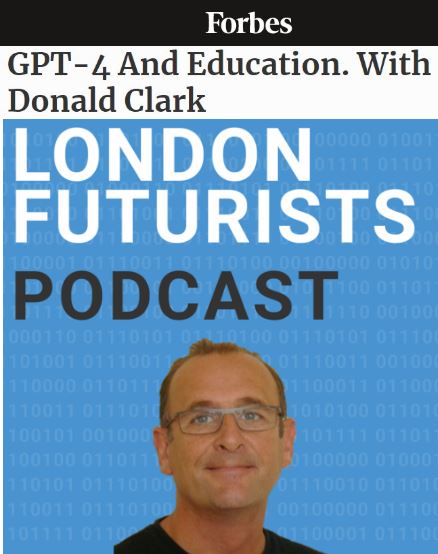Aristotle for everyone
The launch of GPT-4 in March has provoked concerns and searching questions, and nowhere more so than in the education sector. Last month, the share price of US edutech company Chegg halved when its CEO admitted that GPT technology was a threat to its business model.
Looking ahead, GPT models seem to put flesh on the bones of the idea that all students could have a personal tutor as effective as Aristotle, who was Alexander the Great’s personal tutor. When that happens, students should leave school and university far, far better educated than we did.
Donald Clark joined the London Futurists Podcast to discuss these developments. Clark founded Epic Group in 1983, and made it the UK’s largest provider of bespoke online education services before selling it in 2005. He is now the CEO of an AI learning company called WildFire, and an investor in and Board member of several other education technology businesses. In 2020 he published a book called Artificial Intelligence for Learning.
Education is a slow learner
In that book, Clark joked that “education is a bit of a slow learner.” Education has long seemed relatively immune to the charms of technology, but GPT-4 and similar models look set to change that. Previously, most education technology projects were a bit like mosquitos : lots of buzz, tricky to spot, and short-lived. Advanced AI will make past improvements in pedagogy look like rounding errors. GPT-4 has been trained on a corpus of text not far short of the sum total of all human learning. No human teacher gets anywhere near its breadth of knowledge.
A universal tutor based on GPT technology would not only deploy all this knowledge. It would also lack the fads and misconceptions which bedevil teaching at all levels, such as the long-debunked but still-prevalent theories of “learning styles”, including the idea that different people learn better aurally, visually, or kinetically.
Personalised
AI tutors will be personalised – tailored to the needs of individual learners. We all take a different amount of time to master a subject, and grouping 30 students in a class makes it hard to cater for this. Giving everyone a personal AI tutor means that we can all master each part of a subject before we move on to the next part that builds on it. Many wealthy parents know this very well, and hire teachers to tutor their children in one-to-one sessions after school.
Khan Academy, an online teaching service set up in 2006, has been pioneering new pedagogical techniques since the outset, and it is now using GPT-4 to offer something approaching this personalised AI tutor. It acts as a Socratic teacher, asking questions rather than giving answers, and it practises mastery learning, or competency-based learning, urging you to stick with a unit until you have internalised it properly. Maths is perhaps the most important subject to do this in.
Duolingo is another company rushing to deploy services based on GPT-4 for its customer base of a 100 million-plus. Having used both services myself, I have higher expectations for Khan Academy, although Duolingo does produce a pretty good podcast for Spanish language learners.
Raising standards in healthcare and education
Bill Gates wrote recently that the biggest impacts of advanced AI would be felt in education and healthcare. Clark reports that globally, the average general medical practitioner mis-diagnoses just under 5% of cases presented. AI will enable doctors to reduce this number considerably, to the point that it would be considered medical malpractice for a doctor to fail to at least consult an AI when making a diagnosis. There is no corresponding metric in education, but it is certainly true that human teachers vary, they are fallible, and they often fall behind the current thinking in both their subject and in pedagogical techniques. AI will help to raise standards enormously.
A disproportionate amount of the money spent on education is directed to the children of the wealthy, although increasingly, in most countries, families and students are contributing to that spend. Much less is spent on the less privileged 50% of the population. It is ironic, then, that GPT technology seems to threaten the incomes of white-collar people much more than blue-collar people. But in any case, Clark hopes that AI could enable us to re-balance the emphasis, and cultivate more and better learning in less wealthy parts of our communities.
Does the personalised tutor require AGI?
To get today’s GPTs to be fully-fledged Aristotelian personal tutors, they need to be improved in three ways. First they need long-term memories as well as the modest short-term memories (buffers) which they have today. Second, they need a world view, which can also be called common sense. Third, they need the ability to test and assess the provenance of their knowledge, which will eliminate the hallucinations they are currently prone to.
These are not trivial additions, and indeed would take a GPT a long way towards AGI, artificial general intelligence, a machine with all the cognitive capabilities of an adult human. GPT-4 already has elements of a theory of physics, but few people would claim that it fully understands its place in the world, or that of the humans it interacts with.
Which raises the question whether the fully-fledged Aristotelian personalised tutor is possible before we reach AGI. When we do reach AGI we are already into the era of superintelligence, which will raise a whole slew of much bigger questions.



